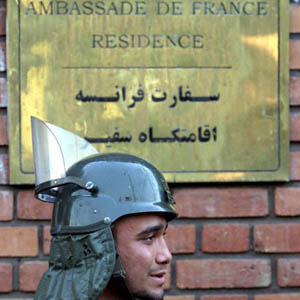Tehran-Paris Ties Going Downhill
Iran-France relations have entered a new phase since Sarkozy has taken office.

With the rise of new political leaders in European countries like France, Germany, and Britain, the foreign diplomacy of these countries has undergone substantial changes.
In Britain, where Gordon Brown has taken office, the focus of attention has shifted from friendship with the United States to domestic problems, while in France with the presidency of Nicola Sarkozy, whose election slogans addressed social welfare and improvement of economic situation, friendship with United States replaced domestic affairs.
French F.M. Bernard Kushner’s harsh tone on Iran’s nuclear program drove all countries to react against it. Nicola Sarkozy called for more serious efforts by the European Union and UN Security Council on Iran’s nuclear issue. He even asked EU members to take stricter measures against Iran, regardless of UN Security Council’s decisions.
Also the tensions relieved after a while, but it seems that France intends to continue its tensive policy against Iran.
Summoning Iranian Ambassador to Paris
In his recent visit to Bushehr, Mahmoud Ahmadinejhad called Israel a filthy Zionist beast and stated that the country is on its deathbed. Following these remarks, France summoned the Iranian Ambassador, Ali Ahani, to notify him about the country’s strong protest to Iranian President’s statements. Pascale Andreani, Spokesman of France’s Foreign Ministry, strongly condemned the recent comments of Iran’s President and warned about such remarks against a UN member. In this meeting, the government of France indicated that issues of Palestine, Israel, and Lebanon are not excuses to question the right of Israel to exist.
Andreani also reminded that the Iran always demands an important role in the region and such statements can bring negative impact of the international community’s view towards Iran.
With the summoning of Iranian Ambassador in France, it was predictable that Iran-France ties will render stormy sooner or later.
On Sunday 3rd of February, Spokesman of Iran’s Foreign Ministry, Mohammad Ali Hosseini, stated that up to now Tehran has restrained itself to confront Paris, but the Islamic Republic of Iran may give a second thought on its relations if France continues the current trend.
Tehran has always tried to maintain its relations with France in a peaceful frame. Having peaceful relations with Iran is also a demand of the French government, since Iran can be one of the best energy sources for this country due to its rich sources of oil and gas. Tehran doesn’t wish for strained ties with Paris to harm its case in 5+1 group. Therefore it has always followed a policy of self-restraint.
In his recent interview with Islamic Republic newspaper, Ali Akbar Velayati, Supreme Leader’s advisor in international affairs, has mentioned that: “the French are vexed with the problems caused by America after the Second World War. The missile defense system installed in Czech Republic by the Americans which has distressed the Russians has victimized the Europeans, since the Russian missile defense system is exactly pointed in the direction of the Czech missile defense system, thus towards Europe. Europe has been the United States’ clay pigeon, whether during the Cold War or military wars, and French are seeking independence, in opinion and practice.
The French are looking for separate interests. Europeans’ motive to found EU was confrontation with NATO and the United States. It is the Americans who are the leader of NATO. They send NATO forces to Afghanistan and when they face a shortage of troops, US Secretary of Defense sends a strongly-worded letter to the German Defense Minister asking why they’re not sending troops. Germany, in response, rejects this request.
Euro is rising and dollar is falling. The countries that are more European, more independent, and have a well-established, anti-American culture -like France- are naturally interested in Iran and call for the expansion of ties.”
But it seems that summoning of Iranian Ambassador in Paris has ended Tehran’s self-restraint. As a result of the partial stance of Paris in supporting Israel, Iran’s Foreign Ministry called Bernard Poletti, France’s Ambassador.
Mostafa Doulatyar, Director General for Western Europe at the Foreign Ministry, notified Poletti about Iran’s protest and discontent on France’s recent stances and intensification of France’s unpleasant tone while Iran’s negotiations with European officials have progressed. He also expressed his discontent that France, ignorant of the current international realities, is even surpassing the United States and has taken harsh stances against Iran. He also lamented that international organizations and French statesmen have turned a blind eye on Israel’s crimes in Gaza.
In response, the French Ambassador indicated that France does not support Israel’s raid on Gaza and the Israeli Ambassador has been summoned to France’s Foreign Ministry frequently. Claiming that France deems Iran as its friend, Mr. Poletti asked for expansion of ties in all areas.
Ties are turning sour while in his recent trip to UAE, Nicola Sarkozy signed a deal to establish a French military base in Abu Dhabi. According to this contract, 400-strong military troops will be deployed in the military base in Strait of Hormuz. It is not clear whether this is aimed to reinforce the United States position in the region or France tends to replace America in the Middle East. Although the presence of 500 French military men can have a mere symbolic aspect, on the other hand it can trigger not-so-friendly measures.

